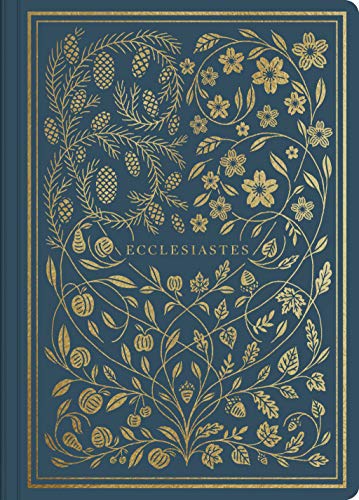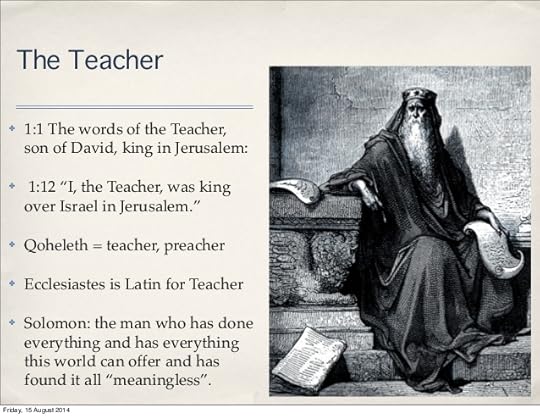What do you think?
Rate this book


46 pages, Paperback
First published January 1, 301
تمامی كارهايی را كه زير آسمان كرده میشود ديدم، كه اينک همهی آنها بطالت و در پیِ باد زحمت كشيدن است. كج را راست نتوان كرد و ناقص را بشمار نتوان آورد. در دل خود تفكر نموده، گفتم "اينک من حكمت را به غايت افزودم، بيشتر از همگانی كه قبل از من بر اورشليم بودند" و دل من حكمت و معرفت را بسيار دريافت نمود و دل خود را بر دانستن حكمت و دانستن حماقت و جهالت مشغول ساختم. پس فهميدم كه اين نيز در پیِ باد زحمت كشيدن است. زيرا كه در كثرت حكمت كثرت غم است و هر كه علم را بيفزايد، حزن را میافزايد. / جامعه باب 1: آیه 13 - 18
چنانكه از رحم مادرش بيرون آمد، همچنان برهنه خواهد برگشت و از مشقت خود چيزی نخواهد يافت كه به دست خود ببرد و او را چه منفعت خواهد بود از اينكه در پی باد زحمت كشيده است؟ تمامی ايام، خود را در تاريكی میخورد و با بيماری و خشم، بسيار محزون میشود. اينک آنچه نيكو میباشد، اين است كه انسان در تمامی ايام عمر خود بخورد و بنوشد و از تمامی مشقتی كه در زير آسمان میكشد، به نيكويی تمتع ببرد، زيرا كه نصيبش از زندگی تنها همين است
پس ختم تمام امر را بشنویم. از خدا بترس و ائامر او را نگاه دار، چونکه تمامی تکلیف انسان این است (جامعه 12: 13)
Κατόπι είδα τα έργα μου,Στο βάθος του έργου υπόκειται το memento mori, η πανταχού παρούσα παροδικότητα του ματαιότης ματαιοτήτων, τίποτα δεν αντιστέκεται στο θάνατο και στη φθορά που επιφέρει. Ένα άκρως υπαρξιακό κείμενο που φέρνει στο νου την Ερωφίλη του Χορτάτση και τον πρόλογο του Χάρου:
όσα φτιάξαν τα χέρια μου,
όσα δώσαν οι κόποι μου.
Και είδα: όλα ανώφελα·
κυνήγι του ανέμου.
[...]ποιος εκ τσ' ανθρώπους τσι μικρούς να ελπίζειΗ δυναμική της αστάθειας της ανθρώπινης μοίρας, της προσωρινότητας, είναι σύνηθες θεματικό κέντρο και νομοτελειακό, από κοινού με τη μπαρόκ εμμονή στο θάνατο και τη ματαιότητα της ύπαρξης, ωστόσο ο Εκκλησιαστής βρίσκει το νόημα παρόλο το ανώφελο της ζωής, η ίδια η χαρά απαλύνει τον εφήμερο βίο.
πλιό τυχαίνει
σε δόξες, πλούτη και τιμές, κι οπίσω τως
να πηαίνει;
Φτωχοί, τ' αρπάτε, φεύγουσι, τα σφίγγετε,
πετούσι,
τα περμαζώνετε, σκορπού, τα κτίζετε, χαλούσι.
Σα σπίθα σβήνει η δόξα σας, τα πλούτη σας
σα σκόνη
σκορπούσινε και χάνουνται, και τ' όνομά σας
λειώνει
σα να 'το με τη χέρα σας γραμμένο
σ' περιγιάλι
στη διάκριση τση θάλασσας[...]
“Vanity of vanities, saith the Preacher, vanity of vanities; all is vanity. What profit hath a man of all his labour which he taketh under the sun? One generation passeth away, and another generation cometh: but the earth abideth for ever. The sun also ariseth, and the sun goeth down, and hasteth to his place where he arose. The wind goeth toward the south, and turneth about unto the north; it whirleth about continually, and the wind returneth again according to his circuits. All the rivers run into the sea; yet the sea is not full; unto the place from whence the rivers come, thither they return again. All things are full of labour; man cannot utter it: the eye is not satisfied with seeing, nor the ear filled with hearing. The thing that hath been, it is that which shall be; and that which is done is that which shall be done: and there is no new thing under the sun. Is there anything whereof it may be said, see, this is new? It hath been already of old time, which was before us. There is no remembrance of former things; neither shall there be any remembrance of things that are to come with those that shall come after. I, the Preacher, was king over Israel in Jerusalem. And I gave my heart to seek and search out by wisdom concerning all things that are done under heaven: this sore travail hath God given to the sons of man to be exercised therewith. I have seen all the works that are done under the sun; and, behold, all is vanity and vexation of spirit. That which is crooked cannot be made straight: and that which is wanting cannot be numbered. I communed with mine own heart, saying, Lo, I am come to great estate, and have gotten more wisdom than all they that have been before me in Jerusalem: yea, my heart had great experience of wisdom and knowledge. And I gave my heart to know wisdom, and to know madness and folly: I perceived that this also is vexation of spirit. For in much wisdom is much grief: and he that increaseth knowledge increaseth sorrow.”
“Remember now thy Creator in the days of thy youth, while the evil days come not, nor the years draw nigh, when thou shalt say, I have no pleasure in them; while the sun, or the light, or the moon, or the stars, be not darkened, nor the clouds return after the rain: In the day when the keepers of the house shall tremble, and the strong men shall bow themselves, and the grinders cease because they are few, and those that look out of the windows be darkened, and the doors shall be shut in the streets, when the sound of the grinding is low, and he shall rise up at the voice of the bird, and all the daughters of music shall be brought low; also when they shall be afraid of that which is high, and fears shall be in the way, and the almond tree shall flourish, and the grasshopper shall be a burden, and desire shall fail: because man goeth to his long home, and the mourners go about the streets: Or ever the silver cord be loosed, or the golden bowl be broken, or the pitcher be broken at the fountain, or the wheel broken at the cistern. Then shall the dust return to the earth as it was: and the spirit shall return unto God who gave it. Vanity of vanities, saith the Preacher; all is vanity.”
کتاب جامعه را میتوان يک کتاب فلسفی قلمداد کرد. نويسندهء آن، که به احتمال زياد سليمان است، حكيم و فيلسوفی است که بين ايمان و شک، اميد و يأس، لذت و رنج، مفهوم زندگی و پوچی، در نوسان است. او میداند که انسان خاکی مجبور است زمان حال را پشت سر گذاشته، به سوی آينده در حرکت باشد
انسان تشنهء اميد است ولی از آينده اطلاعی ندارد، پس بهتر اين است که از زمان حاضر لذت ببرد. نويسنده کتاب، بدنبال مفهوم زندگی رفته و کوشيده آن را در لذتجويی، حكمت و ثروت بيابد ولی نتيجه ای عايدش نشده. او همهء اينها را تجربه کرده و آنها را پوچ و بیارزش میداند زيرا
شر و بدی، سايهء شوم خود را بر هر تكاپويی جهت کشف معنی زندگی افكنده است ولی از همه بدتر مرگ است که مانند موج دريا به ساحل زندگی اصابت میکند و کاخ شنی آن را محو و نابود میسازد. انسان مانند حيوان، و حكيم مانند احمق، و عادل مانند شرور میميرند ...

ای جوان، روزهای جوانيت را با شادی بگذران و از آن لذت ببر و هر چه دلت میخواهد انجام بده، ولی به ياد داشته باش که برای هر کاری که انجام
میدهی بايد به خدا جواب دهی. روزهای جوانی زود میگذرد، پس نگذار جوانيت با غم و سختی سپری شود. آفرينندهء خود را در روزهای جوانيت به
ياد آور، قبل از اينكه روزهای سخت زندگی فرا رسد روزهايی که ديگر نتوانی از آنها لذت ببری. آفرينندهء خود را به ياد آور قبل از اينكه ابرهای تيره آسمان زندگی تو را فرا گيرند، و ديگر خورشيد و ماه و ستارگان در آن ندرخشند؛ دستهای تو که از تو محافظت میآنند، بلرزند و پاهای قوی تو ضعيف گردند؛ دندانهايت کم شوند و ديگر نتوانند غذا را بجوند و چشمانت کم سو گردند و نتوانند چيزی را ببينند؛ گوشهايت سنگين شوند و نتوانند سر و صدای کوچه و صدای آسياب و نغمهء موسيقی و آواز پرندگان را بشنوند؛ به سختی راه روی و از هر بلندی بترسی؛ موهايت سفيد شوند، قوت تو از بين برود و
اشتهايت آور شود؛ به خانهء جاودانی بروی و مردم در کوچه ها برای تو سوگواری آنند